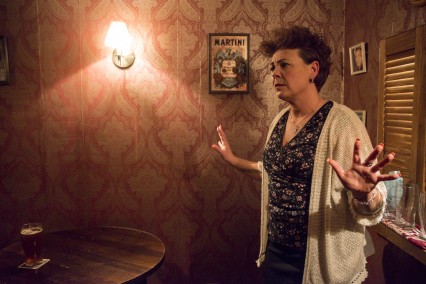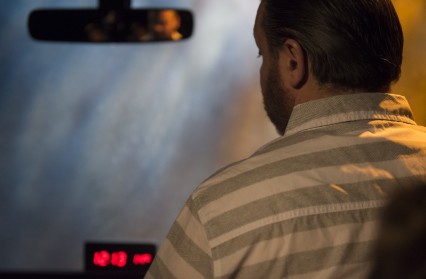Jemma Beggs walks through the very affecting new promenade play from Matthew Bulgo and The Other Room, Constellation Street.
The final piece in the Insomnia Season of Cardiff’s pub theatre, The Other Room, Matthew Bulgo’s Constellation Street crackles with an electrifying energy; the raw desperation of the characters seeping into the atmosphere of Porter’s modest venue which has been transformed into a miniature Cardiff. A play of the traditional sense in name only, this is an immersive theatre experience, in which tickets are replaced with key cards determining where different members of the audience will be directed, and which three of the four monologues they will witness.
 Clutching my key card which reads Penylan Court, I am ushered into a darkened tunnel resembling a night-time road, the sounds of traffic filling the tiny space, before a helpful assistant points me in the direction of an even tinier room. A quarter of the audience cram in and the door shuts behind us. The room has been converted into an oversized taxi, the sound of rain pattering onto the faux windscreen as the driver, Frank (Roger Evans), sits thumbing through a newspaper, seemingly oblivious to our company. Suddenly catching sight of us in his rear-view mirror, he almost jumps a mile before launching into a classic taxi driver patter, flaunting his superior road knowledge, talking about his boy Tommy and lamenting the state of the world with
Clutching my key card which reads Penylan Court, I am ushered into a darkened tunnel resembling a night-time road, the sounds of traffic filling the tiny space, before a helpful assistant points me in the direction of an even tinier room. A quarter of the audience cram in and the door shuts behind us. The room has been converted into an oversized taxi, the sound of rain pattering onto the faux windscreen as the driver, Frank (Roger Evans), sits thumbing through a newspaper, seemingly oblivious to our company. Suddenly catching sight of us in his rear-view mirror, he almost jumps a mile before launching into a classic taxi driver patter, flaunting his superior road knowledge, talking about his boy Tommy and lamenting the state of the world with
the shootings and the bombs going off. The little kiddies going missing and people lopping other people’s ‘eads off, ISIS or ISIL or whatever they’re calling it. And then there’s the global warming and the cuts and the…bleeding hurricanes…and…See. I think we know. I think we know we’ve fucked it.
Evans’ easy chatter steadily darkens as his cheery taxi man persona fades to reveal a mere shadow of a man, struggling to come to terms with a crushing sense of guilt and desperate for forgiveness; his display of vulnerability hitting all the harder after his jaunty, slightly obnoxious manner. Once his tale is done, he goes back to his paper, softly repeating the same few lines from the beginning of the monologue. The door swings open and we leave Frank to continue repeating the sad cycle of his lonely life.
Outside, a girl perches atop a pile of bricks, wide eyes darting round the audience, microphone clutched in hand and intermittently taking swigs from the can in her hand, as she sings a drunken version of Kodaline’s ‘All I Want’. Outwardly humorous, a thread of pain runs through her voice, undercutting the lyrics with a foreboding emphasis;
But if you loved me
Why’d you leave me?
Take my bodyTake my body
All I want is,
And all I need is
To find somebody.
I’ll find somebody like you.
 The song ends and the audience move on to the next performance which takes place in a hotel room. Some people sit on the double bed as the rest line the room; unsure who the actor is, we all eye each other somewhat suspiciously before a man shuts the door and begins to speak, his lilting Irish accent tinged right from the off with a volatile edge. Stephen (Neal McWilliams) is another lost soul, haunted by his past and desperate for some measure of peace and comfort, however fleeting. McWilliams performs with an unrelenting intensity, hands and voice shaking with the emotion of his story as he convincingly portrays a broken man. With each section of the monologue, he fixes upon a different audience member, piercing them with a gaze impossible to break, as he pours out the tragedy of his life. The experience, heightened by the confines of the small space in which we are enclosed, is profound. The final lines of dialogue are beautiful in their utter heart-breaking delivery; a true union of superb writing and acting, which leaves a hard lump in my throat and the hair standing on the back of my neck.
The song ends and the audience move on to the next performance which takes place in a hotel room. Some people sit on the double bed as the rest line the room; unsure who the actor is, we all eye each other somewhat suspiciously before a man shuts the door and begins to speak, his lilting Irish accent tinged right from the off with a volatile edge. Stephen (Neal McWilliams) is another lost soul, haunted by his past and desperate for some measure of peace and comfort, however fleeting. McWilliams performs with an unrelenting intensity, hands and voice shaking with the emotion of his story as he convincingly portrays a broken man. With each section of the monologue, he fixes upon a different audience member, piercing them with a gaze impossible to break, as he pours out the tragedy of his life. The experience, heightened by the confines of the small space in which we are enclosed, is profound. The final lines of dialogue are beautiful in their utter heart-breaking delivery; a true union of superb writing and acting, which leaves a hard lump in my throat and the hair standing on the back of my neck.
Finally, we return to the outside area where the girl is waiting, microphone and can still clenched in her hands. Alex (Gwenllian Higginson) is out on the streets, the type of person who careers from one disaster to another, her life an obvious mess, yet trying to cover it with bravado and a cheeky smile. Hers is a shocking story, delivered bluntly and peppered with foul language, without any of the self-sorrow seen in previous characters despite the trauma of her life.
I chose you. That’s what she said. He didn’t want you. But I chose you.
As the story unfolds, the lyrics of her earlier song begin to resonate, the combination of the emotional song and detached dialogue forming a true image of the suffering Alex tries to mask. As the sun rises, and the play ends, she looks to the sky, one more lost soul amongst the streets of Cardiff.
Throughout, pieces of information weave their way from one monologue to the next, sometimes subtly, sometimes more overtly, intertwining the characters and revealing the events that link them. Constellation Street is a fictional glimpse into a very real world of choices and consequences, and should not be missed.
(photo credit: Aenne Pallasca)
Jemma Beggs is a frequent contributor to Wales Arts Review.











